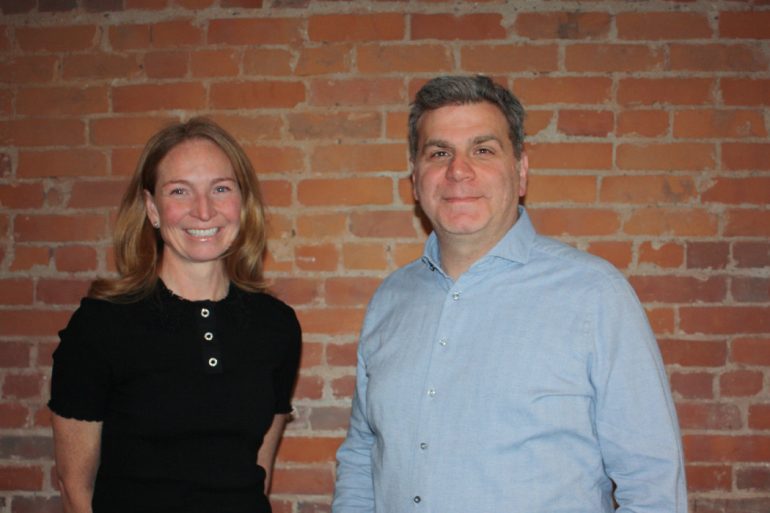Toronto-based The Group Ventures (TGV) has secured a first close of approximately $20 million CAD for its second fund.
Led by Israeli entrepreneur-turned investor Sion Balass, the former managing director of BMO’s Innovation Fund, Chanda Carr, and the ex-head of Canadian banking for Scotiabank, Anatol von Hahn, TGV focuses on early-stage Canadian and Israeli tech startups.
TGV leverages Sion Balass’ Israel connections to tap into investment opportunities in the country’s booming startup ecosystem.
In an exclusive interview with BetaKit, Balass and Carr spoke about the firm’s first fund, investment strategy, and what TGV hopes to accomplish through Fund II.
With Fund II, TGV aims to build on the success it has seen through Fund I backing Canadian tech startups like MindBridge and Flybits, and leverage Balass’ Israel connections to tap into investment opportunities in the country’s booming startup ecosystem.
TGV declined to disclose its Fund II investors, saying only that it was supported by a group of private investors that includes family offices; senior-level executives from the banking, insurance, and health industries; and operators from the tech, real estate, manufacturing, and logistics sectors.
“I moved here about 12 years ago from Israel,” said Balass. “I had my own tech company that we sold more or less at the same time, and moved to Canada. I had this entrepreneurial background, worked with lots of startups, invested in some startups, and then a group of us in 2018 decided we wanted to set up [our own] fund.”
Balass founded TGV with von Hahn, GenesisCare COO Michael O’Sullivan, WW (formerly Weight Watchers) President and GM Kevin O’Brien, Anthony Toldo, and Mohit Kirpalani. The firm’s investment efforts are spearheaded by Balass and Carr as co-managing partners, with support from von Hahn as TGV chairman and partner. O’Sullivan, O’Brien, Toldo, and Kirpalani serve as partners.
Balass declined to disclose Fund I’s exact size, calling it “small.” TGV invested in a total of five companies through its first fund, including Ottawa-based artificial intelligence (AI) startup MindBridge and Toronto software firm Flybits, both of which cater to the financial services industry.
RELATED: Eli Fathi retiring as MindBridge CEO
TGV also invested in New York-based healthtech platform Belong.Life, Israel AutoTech startup Tactile Mobility, and Israeli angel investment platform iAngels through its first fund.
“We did very, very well there,” said Balass, noting that Fund I is “well on target” to achieve threefold returns.
Carr joined TGV in July 2021, after spending the prior three years serving as managing director and head of the FinTech-focused BMO Innovation Fund, which she “conceptualized, built and ran.” Prior to that, Carr spent over a decade working in investment banking at Citi, Rothschild & Co, and CIBC Capital Markets.
Balass described the addition of Carr as “a big step” for TGV, as the firm looks to ramp up its investment efforts through Fund II.
When Carr left BMO, she set out to find a role in venture capital, before eventually landing on TGV, which she described as “an extremely powerful little machine” that “punches way above its weight” in the early-investing space.
RELATED: Flybits secures $45 million CAD Series C for context-as-a-service platform
One of the things that attracted Carr to TGV was the strength of the firm’s team, which has collectively founded 16 companies, made over 30 investments, and held board and advisory positions with a range of different startups, incubators, and accelerators.
TGV focuses on primarily B2B startups at the “post-seed, pre-Series A, Series A-stage,” with an eye towards the window where companies need to transition “from a product technology company to a sales organization.”
“We invest when the technology’s there, the technology risk has been mitigated … but the company doesn’t have strong or very strong commercialization traction,” said Balass.
Although TGV is sector-agnostic, the firm has a bias towards financial services and digital healthcare businesses given the background of its team and investors. TGV’s strategy involves participating in these rounds, writing first cheques of between $2 to $3 million.
Balass’ Israel connections afford TGV some unique investment opportunities. Headlined by startups like Tipalti, Wiz, and Deel, Israel’s tech ecosystem saw a record-breaking 2021 in terms of venture funding. “My relationship [with the Israel tech ecosystem] and the access we have to deal flow there is very good,” said Balass, who described the country’s tech sector as “phenomenal.”
RELATED: Roach Capital closes $6.4 million for first fund from prominent VCs, Shopify execs
Amid an increasingly competitive VC landscape, Carr and Balass see a few things as differentiating TGV from other players, including its focus on both Canada and Israel, its operator-driven approach, and the time it spends getting to know startups before investing.
“We tend to dig in six to 24 months before we ever invest and work at the table with them,” said Carr. “[This] gives us an amazing vantage point for understanding the business and gaining trust.”
TGV is currently working to secure its second close for Fund II, for which the firm has set a total target of $40 million. Through Fund II, TGV aims to invest in a total of 10 to 12 companies. The firm has already chosen its first, backing Israeli third-party risk management company Mirato.
“We don’t believe in being the biggest fund,” said Balass. “We believe in building a tight portfolio … a very high quality portfolio, where every single company counts.”
Feature image of Chanda Carr and Sion Balass, courtesy The Group Ventures.


